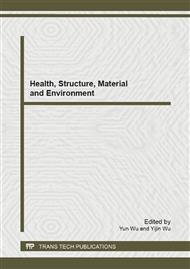[1]
Zhang, X.S., Shen, J.M., Li, W. et. al. Disposal and Treatment of Municipal Solid Waste: State-of-the-ART[J]. Journal of Safety and Environment, 2003, 3(4): 60~64.
Google Scholar
[2]
Wang, F.M., Cheng, M. l., & Zhang, Y. Prevention and Management of Secondary Pollution on Domestic Refuse Disposal[J]. Urban Environment & Urban Ecology, 2002, 15(4): 7~9.
Google Scholar
[3]
Therivel, R., & Wilson, E. Thompson S et al. Strategic Environmental Assessment[M]. London: Earthscan Pulication Ltd, (1992).
Google Scholar
[4]
Therivel, R., & M.R. Patidario. The Practice of Strategic Environmental Assessment[M]. London, UK; Earthscan Publication Limited. (1996).
Google Scholar
[5]
Bao, C.K., Lu, Y.S., & Shang, J.C. Development and practices of strategic environmental assessment in China[J]. Int. J. of Environment and Pollution. 2004, 21(1): 64–79.
Google Scholar
[6]
Shang, J.C., & Bao, C.K. Introduction to Strategic Environmental Assessment[M]. Beijing: Science Press, (2003).
Google Scholar
[7]
Cai, Y.M., Li ,T.W., & Wang, H. Difference in Environment Assessment of Land Use Planning between China and Europe Union[J]. Progress in Geography, 2008. 22(7): 75~79.
Google Scholar
[8]
Cai, Y.M., Xie, J.Q., & Du, G.Y. Methodology of Plan-based Environm ental Impact Assessment in Land Use Planning[J]. China Land Science, 2005. 19(2): 3~9.
Google Scholar
[9]
Feng, C.T. Study on Developing Index System of Environmental Impact Assessment in Land Use Planning[J]. Resource Development & Market, 2004. 20(6): 416~420.
Google Scholar
[10]
Dong, J.H., Bao, C.K., & Jiang, D.H. Technical Methods of Environmental Impact Assessment for Land Use Planning[J]. Sichuan Environment, 2006. 25(3): 50~54.
Google Scholar
[11]
Bao, C.K., Wang, J.N., & Luo, H. Policy Sustainable Development Assessment. Beijing Science Press. (2009).
Google Scholar
[12]
Zhou, Y.L., & Bao, C.K. Study of Policy Environmental Impact Assessment Model Based on the Analysis of Policy Structure. First China Strategic Environmental Assessment Forum, (2009).
Google Scholar
[13]
Cai, Y.M., Xie, J.Q., & Zhou. L.X. Discussion on Environmental Impact Assessment for Land Use Policy. First China Strategic Environmental Assessment Forum, (2009).
Google Scholar
[14]
Li, L.P. Environmental Impact Assessment of Chemical Industry Trade Policy . Environmental Protection, 2007, (8): 44~46.
Google Scholar
[15]
Mao, X.Q., Li, X.Q., Tu, Y.Y. et. al. Environmental Impact Assessment of Agricultural Trade Policy—a Wheat Planting Industry Case Study in Qian'an County, Hebei Province[J]. China Population, Resources and Environment, 2005. 15(6): 40~45.
Google Scholar
[16]
Xu, H. Chen, Y.Q., Lin, J.Z. et. al. China Strategic Environmental Impact Assessment Theory and Practice [M]. Beijing Science Press. (2010).
Google Scholar
[17]
Shang, J.C., & Bao, C.K. Introduction to Strategic Environmental Assessment[M]. Beijing : Science Press . (2003).
Google Scholar
[18]
Gao, J.X. Theoretical Exploration of Sustainable Development [M]. Beijing: China Environmental Science Press. (2002).
Google Scholar
[19]
Hu, R.L. Low carbon economic and Chinese economic sustainable development[J]. Social Scientist, 2009(2): 47-50.
Google Scholar
[20]
International Experience and Development Tendency of Low carbon economic transition. China Network, 2009, 12, 11.
Google Scholar
[21]
The Copenhagen climate changing meeting about implementing the bali route map position in China. The central People's Government network. 2009. 5. 21.
Google Scholar
[22]
Jintao Hu's speech in APEC fifteenth leadership informal meeting [R]. The central People's Government network . 2007. 09. 08.
Google Scholar
[23]
Mao , J. Low-carbon Development at the Angle of Government Governance in China[J]. Management & Fortune B, 2010, (4): 118-119.
Google Scholar
[24]
China 21 Agenda Administration Center. Center of Environmental Sound Technology Transfer. Tools Guide of Sustainable Solid Waste Management at Industrial Park[M]. Chemical Industry Press. (2007).
Google Scholar
[25]
Ma, H.X. Developing Circular Economy , Optimizing Municipal Solid Waste Management [J]. China Resources Comprehensive Utilization, 2005. 12, (12): 16-18.
Google Scholar


